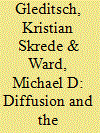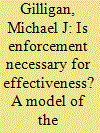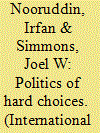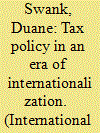| Srl | Item |
| 1 |
ID:
075221


|
|
|
|
|
| Publication |
2006.
|
| Summary/Abstract |
Over the past forty-five years, bilateral investment treaties (BITs) have become the most important international legal mechanism for the encouragement and governance of foreign direct investment. The proliferation of BITs during the past two decades in particular has been phenomenal. These intergovernmental treaties typically grant extensive rights to foreign investors, including protection of contractual rights and the right to international arbitration in the event of an investment dispute. How can we explain the widespread adoption of BITs? We argue that the spread of BITs is driven by international competition among potential host countries-typically developing countries-for foreign direct investment. We propose a set of hypotheses that derive from such an explanation and develop a set of empirical tests that rely on network measures of economic competition as well as more indirect evidence of competitive pressures on the host to sign BITs. The evidence suggests that potential hosts are more likely to sign BITs when their competitors have done so. We find some evidence that coercion and learning play a role, but less support for cultural explanations based on emulation. Our main finding is that the diffusion of BITs is associated with competitive economic pressures among developing countries to capture a share of foreign investment. We are agnostic at this point about the benefits of this competition for development.
|
|
|
|
|
|
|
|
|
|
|
|
|
|
|
|
| 2 |
ID:
075225


|
|
|
|
|
| Publication |
2006.
|
| Summary/Abstract |
The Kantian peace research program has produced generally robust results on the role of democracy and international trade in reducing the risk of international conflict. Yet a key theoretical linkage in the Kantian argument, that of international governmental organizations (IGOs) to peace, has proved less robust and more problematic. We propose a new theoretical perspective focusing on the contributions of a particular kind of IGO-that composed largely of democracies-to peaceful conflict resolution through aiding credible commitments, dispute settlement, and socialization to peaceful behavior. A set of statistical tests provides strong support for our hypotheses that such densely democratic IGOs are far more likely to engender peaceful relations between members than are more homogenous IGOs. This is true when controlling for regime type, interdependence, and several realist-oriented influences. The peace-inducing influences affect both democratic and nondemocratic member states.
|
|
|
|
|
|
|
|
|
|
|
|
|
|
|
|
| 3 |
ID:
075223


|
|
|
|
|
| Publication |
2006.
|
| Summary/Abstract |
Democracy does not evolve sui generis. The spatial clustering in democracy and transitions suggests that international factors play a prominent role in forging democracies as well as influencing their durability. We argue that democracy often comes about as a result of changes in the relative power of important actors and groups as well as their evaluations of particular institutions, both of which are often influenced by forces outside the country in question. The scope and extent of connections with other democratic countries in a region can strengthen support for democratic reform and help sustain institutions in transitional democracies. Results from a transition model demonstrate that international factors can exert a strong influence on the prospects for transitions to democracy, and the spatial clustering in democracy and transitions cannot adequately be explained by the hypothesized domestic social requisites of individual countries.
|
|
|
|
|
|
|
|
|
|
|
|
|
|
|
|
| 4 |
ID:
075220


|
|
|
|
|
| Publication |
2006.
|
| Summary/Abstract |
Political scientists, sociologists, and economists have all sought to analyze the spread of economic and political liberalism across countries in recent decades. This article documents this diffusion of liberal policies and politics and proposes four distinct theories to explain how the prior choices of some countries and international actors affect the subsequent behavior of others: coercion, competition, learning, and emulation. These theories are explored empirically in the symposium articles that follow. The goal of the symposium is to bring quite different and often isolated schools of thought into contact and communication with one another, and to define common metrics by which we can judge the utility of the contending approaches to diffusion across different policy domains.
|
|
|
|
|
|
|
|
|
|
|
|
|
|
|
|
| 5 |
ID:
075224


|
|
|
|
|
| Publication |
2006.
|
| Summary/Abstract |
Recently, scholars have questioned whether enforcement mechanisms are necessary to make regimes effective. This article provides a model of the international criminal regime in which the regime changes state behavior even though it possesses no enforcement mechanisms. The article also answers several prominent criticisms of the International Criminal Court (ICC). Critics claim that the ICC is at best futile because it lacks the power to apprehend the criminals it is meant to prosecute. Even worse, the ICC may be harmful because it will induce atrocious leaders to hold on to power longer than they would if they could step down with immunity for past crimes. The model in this article suggests those criticisms may be inaccurate. I model the interaction between a leader and a foreign state that has the option of offering that leader asylum. I examine the effect of the creation of an ICC-like institution on that interaction. The model produces three main findings. (1) Leaders' reigns will not be prolonged as a result of the regime. (2) Although the institution has no enforcement power, some leaders (those with such a high probability of being deposed that they would willingly surrender to the institution rather than try to stay in office) will be punished by it. In those circumstances, the foreign state has no incentive to offer the leader asylum. (3) The institution may deter some atrocities at the margin.
|
|
|
|
|
|
|
|
|
|
|
|
|
|
|
|
| 6 |
ID:
075226


|
|
|
|
|
| Publication |
2006.
|
| Summary/Abstract |
A central component of International Monetary Fund (IMF) programs is reducing government budget deficits. We ask how domestic political considerations shape the distribution of cuts made by governments in IMF programs. Our central finding is that IMF programs shrink the role played by domestic politics. While democracies allocate larger shares of their budgets to public services in the absence of IMF programs, the difference between democracies and nondemocracies disappears under IMF programs. This result has important implications for our understanding of government spending priorities under different resource constraints.
|
|
|
|
|
|
|
|
|
|
|
|
|
|
|
|
| 7 |
ID:
075222


|
|
|
|
|
| Publication |
2006.
|
| Summary/Abstract |
I offer an explanation for the widespread diffusion of neoliberal tax policies in the developed democracies. After accounting for the policy influences of commonly experienced domestic and international forces, I consider several plausible paths of diffusion of neoliberal tax structure. My central argument is that the highly visible 1980s market-conforming tax reform in the United States should be especially important in shaping subsequent tax policies in other polities. There are substantial reasons to believe, however, that domestic political and institutional forces will shape policymaker assessment of the benefits and costs of neoliberal reforms: the strength of right parties and the degree to which the median voter has moved right should condition adoption of neoliberal tax policy; the institutions of national and sector-coordinated capitalism should also slow the enactment of neoliberal tax reforms. I assess these arguments with empirical models of 1981-98 tax rates on capital in sixteen nations. I find that changes in U.S. tax policy influence subsequent reforms in other polities; in the long term, all nations move toward the U.S. neoliberal tax structure. Analysis also shows, however, that the short-term responsiveness to U.S. tax reforms is notably greater where uncoordinated market institutions are dominant. Theory and extensive qualitative and quantitative evidence indicate that pressures to compete for mobile assets, as balanced against the economic and political costs of adoption, anchor the process of diffusion of neoliberal tax policy. There is little evidence for the view that systematic policy learning or social emulation drove tax policy diffusion.
|
|
|
|
|
|
|
|
|
|
|
|
|
|
|
|